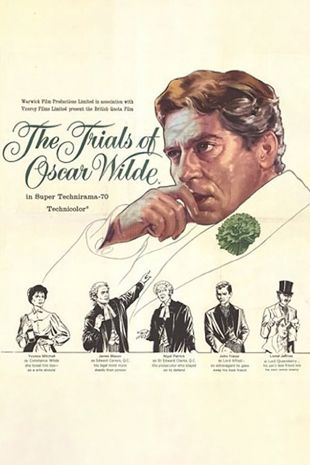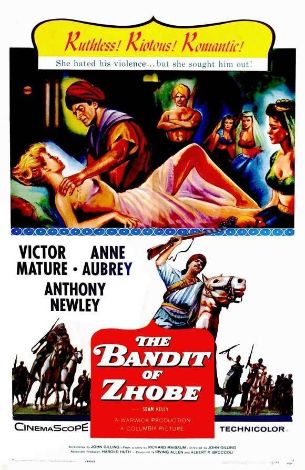Irving Allen was one of the busier, if not always one of the classier, movie producers of the post-World War II era, with a string of successful action-adventure films stretching from the end of the 1940s into the early '70s. Born Irving Applebaum in Poland in 1905, he entered the movie industry as an editor at Universal in 1929, just as synchronized sound was making editing into a new kind of art, and later worked for Paramount and Republic. He moved up to directing on short subjects with Forty Boys and a Song (1941) -- billed as Irving Applebaum -- and later made a string of low-budget features, including Avalanche (1946) and 16 Fathoms Deep (1948), as Irving Allen. The latter movie, a remake of an old adventure-thriller from the early '30s, demonstrated his cleverness as a producer -- Allen turned it into a test vehicle for a then-new German photographic process called Anscocolor, which Hollywood was looking at as a possible lower-cost alternative to Technicolor. As a result, all of the major trade papers and studio production chiefs paid attention to this low-budget film, which also achieved a somewhat wider release than would normally have been the case. On the other hand, the movie's flaws also highlighted Allen's limitations as a filmmaker, for the movie received blistering reviews for its direction and pacing (ironically enough, MGM of all studios, ended up shooting some of its features in Anscocolor). It was the short subjects that Allen produced -- most notably the two-reelers Climbing the Matterhorn (1947) and Chase of Death (1949) -- that attracted serious attention, including several award nominations.
Following the release of Slaughter Trail (1951), Allen gave up directing in favor of producing. The previous year, he'd already found one important route to success when he produced and co-directed (with credited director Burgess Meredith) the mystery thriller The Man on the Eiffel Tower (1950). The film, shot in Paris using American and British cast members, represented a new kind of production, less costly and risky than making movies in Hollywood but retaining the veneer of solid Hollywood releases with well-known stars in leading roles. In 1950, Allen met Albert R. Broccoli -- then an agent with some experience on the production side of movies -- and the two formed Warwick Productions in England to make movies for the international market. Warwick scored a hit right out of the starting gate with the World War II drama The Red Beret (aka Paratrooper, 1953) starring Alan Ladd, with a supporting cast that included such top British talent as Leo Genn and Harry Andrews. The movie wasn't that special as wartime dramas go, apart from its casting and some excellent action scenes, but it was directed by Terence Young and co-authored by Richard Maibaum, both of whom would go on to do far more significant work together in Broccoli's productions. Warwick's subsequent movies, initially distributed by RKO and then by Columbia Pictures, included Hell Below Zero and The Black Knight, both released in 1954 and starring Ladd; A Prize of Gold (1955), starring Richard Widmark; and The Cockleshell Heroes (1955), starring (and directed by) Jose Ferrer and Trevor Howard. Among the few Warwick projects that did not go forward during this period was an attempted Sherlock Holmes television series, as the Conan Doyle estate went with a rival producer.
By the second half of the decade, Allen and Broccoli were relying more often upon aging American leading men, such as Victor Mature in Zarak (1956) and Interpol (1957), or were occasionally (and more interestingly) casting established Hollywood "star" heavies, such as Jack Palance in The Man Inside (1958), or character leads such as Paul Douglas in The Gamma People (1956), as heroes. Allen and Broccoli were also working with the best affordable British directorial talent, including John Gilling, and giving good supporting roles to such up-and-coming actors as Patrick McGoohan and Anthony Newley. Warwick was on something of a treadmill in terms of business, however, as the market for Allen and Broccoli's kind of action movies slowly began shrinking in America, where television often provided audiences with similar thrills without charge. Broccoli had developed an interest in a series of spy novels authored by Ian Fleming that he thought could move Warwick to a higher level. His former employer, Charles K. Feldman, had already bought up the rights to the first of the books, Casino Royale. Allen, however, didn't appreciate the books, which resulted in Broccoli's deciding to acquire the rights on his own. While Broccoli turned his attention increasingly to Fleming's secret agent 007, Allen pursued more ambitious movies as a means of moving up in the business. In 1960, Warwick released The Trials of Oscar Wilde, about the infamous prosecution of the renowned author in 1890s England.
Allen's partnership with Broccoli ended when the latter came to an agreement with producer Harry Saltzman, who owned the rights, but had no production money for the James Bond movies. The latter debuted in 1962 with Dr. No, directed and co-authored, respectively, by Warwick alumni Young and Maibaum. In 1964, Allen released The Long Ships, directed by Jack Cardiff, an adventure yarn set among the Vikings and the Moors. By 1965, however, his former partner's success had transformed the movie industry. Allen jumped aboard the spy movie bandwagon a trifle late, purchasing the screen rights to Donald Hamilton's Matt Helm novels, themselves virtual parodies of Fleming's work; ironically, the man who'd passed up the chance to be on the ground floor of James Bond was now adapting books that weren't half as original or inventive. Almost a burlesque of the Bond movies, the Helm films starred Dean Martin -- once a fine natural actor but now sliding into his "personality" phase -- as an American super-agent whose every line of dialogue is a joke or double-entendre. The Silencers, Murderers' Row (both 1966), The Ambushers (1967), and The Wrecking Crew (1969) were successful sub-Bond vehicles, with the similar but unrelated spy thriller Hammerhead (1968) sandwiched in between the last two. By then, the cycle had run its course, and Allen finished the 1960s with the above-average Western action vehicle The Desperados (1969).
Allen was back on form -- with one of the finest movies of his career -- the following year, with Eyewitness (aka Sudden Terror, 1970), a thriller starring Mark Lester and Lionel Jeffries. That same year, he released the most ambitious production of his career, Cromwell, starring Richard Harris, Alec Guinness, and Dorothy Tutin. That film, clocking in at 145 minutes and done in the epic style popular in costume movies since the early '60s, was released a little too late, and was also too particularly British in subject matter (how many Americans even know there was an English Civil War?) to ever find an audience big enough to cover its vast cost. (In that regard, it very much anticipated Trevor Nunn's Lady Jane, which failed at the box office a decade later for similar reasons.) In 1975, Allen was the executive producer of the short-lived Matt Helm television series starring Anthony Franciosa. He retired in the 1970s, and passed away in 1987, at age 82.


